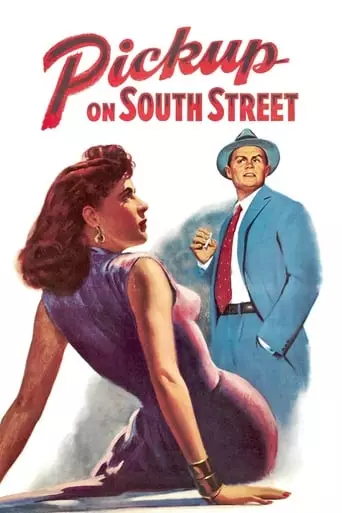
Pickup on South Street (1953) Watch Online Free
In New York City, an insolent pickpocket, Skip McCoy, inadvertently sets off a chain of events when he targets ex-prostitute Candy and steals her wallet. Unaware that she has been making deliveries of highly classified information to the communists, Candy, who has been trailed by FBI agents for months in hopes of nabbing the spy ringleader, is sent by her ex-boyfriend, Joey, to find Skip and retrieve the valuable microfilm he now holds.
Pickup on South Street is a gritty, tense film noir directed by Samuel Fuller, set against the backdrop of Cold War paranoia. The film follows Skip McCoy (Richard Widmark), a petty pickpocket who unwittingly steals a microfilm containing sensitive government information from a woman named Candy (Jean Peters). Candy, unaware of the microfilm’s importance, is a pawn in a larger espionage plot involving Communist agents. McCoy’s theft pulls him into a dangerous world of spies, law enforcement, and double-crossing criminals. As the plot unfolds, McCoy, a morally ambiguous character, finds himself caught between the law, the criminals, and his own survival instincts.
Fuller’s Pickup on South Street explores the intersection of crime, politics, and human nature during a period marked by the Red Scare and intense Cold War anxieties. The film stands out in the noir genre for its focus on individual morality and the impact of larger socio-political forces on personal lives. McCoy, the antihero, is not a typical noir protagonist—he is a small-time criminal with a tough exterior, but his interactions with Candy and the other characters reveal a more complex emotional landscape. Fuller’s direction emphasizes tension through the use of close-ups and shadowy, gritty cinematography, which enhances the atmosphere of suspicion and betrayal.
The film also critiques the political climate of the 1950s, particularly the fear of Communist infiltration. By focusing on a petty criminal rather than a noble detective or spy, Fuller flips the typical espionage narrative, suggesting that the moral choices of ordinary people are just as significant as those made by governments or intelligence agencies. This inversion of expectations contributes to the film’s lasting impact on the genre.
Espionage and the Cold War: At its core, Pickup on South Street is about the complexities of espionage during the Cold War. The film critiques the paranoia surrounding Communist infiltration and espionage, portraying the personal consequences of these larger political tensions. The characters, especially McCoy, are caught in a world where loyalty and morality are constantly questioned.
Moral Ambiguity: The film’s exploration of moral ambiguity is one of its most striking features. McCoy is a thief, but he is also shown to have a code of ethics, unlike the corrupt government agents and criminals around him. This moral complexity reflects the postwar uncertainty about right and wrong, especially in a world where ideologies like Communism and capitalism are at odds.
Survival and Loyalty: The theme of survival is central to the film. McCoy is driven by a need to survive, but his actions also bring into question the price of survival in a morally corrupt world. The relationship between McCoy and Candy adds another layer to this theme, as both characters struggle with loyalty—Candy to her own safety and McCoy to his sense of justice.
After watching Pickup on South Street, you might feel a mix of tension and reflection. The film’s bleak view of human nature and the consequences of espionage will likely leave you contemplating the moral choices of the characters, particularly the complex figure of Skip McCoy. The sense of paranoia and betrayal that permeates the story may resonate long after the film ends, especially given its timely commentary on the political climate of the 1950s. You may also feel a sense of admiration for the film’s unflinching portrayal of characters who, despite their flaws, are navigating a world fraught with danger and uncertainty
